The right software engineers working in DeFi (Decentralized Finance) create innovative and secure financial solutions using blockchain technologies. They play a critical role in designing and implementing decentralized applications (dApps) that operate reliably without the need for intermediaries.
DeFi software engineering skills include knowledge of blockchain platforms such as Ethereum or Binance Smart Chain, proficiency in programming languages like Solidity and JavaScript, as well as strong analytical and communication skills.
Candidates can write these abilities in their resumes, but you can’t verify them without on-the-job Software Engineer (Defi) skill tests.
In this post, we will explore 7 essential Software Engineer (Defi) skills, 6 secondary skills and how to assess them so you can make informed hiring decisions.
Table of contents
7 fundamental Software Engineer (Defi) skills and traits
The best skills for Software Engineer (Defi)s include Blockchain Programming, Smart Contract Development, Cryptography, Decentralized Application (dApp) Development, Knowledge of DeFi Protocols, Security Auditing and Web3.js or Ethers.js.
Let’s dive into the details by examining the 7 essential skills of a Software Engineer (Defi).
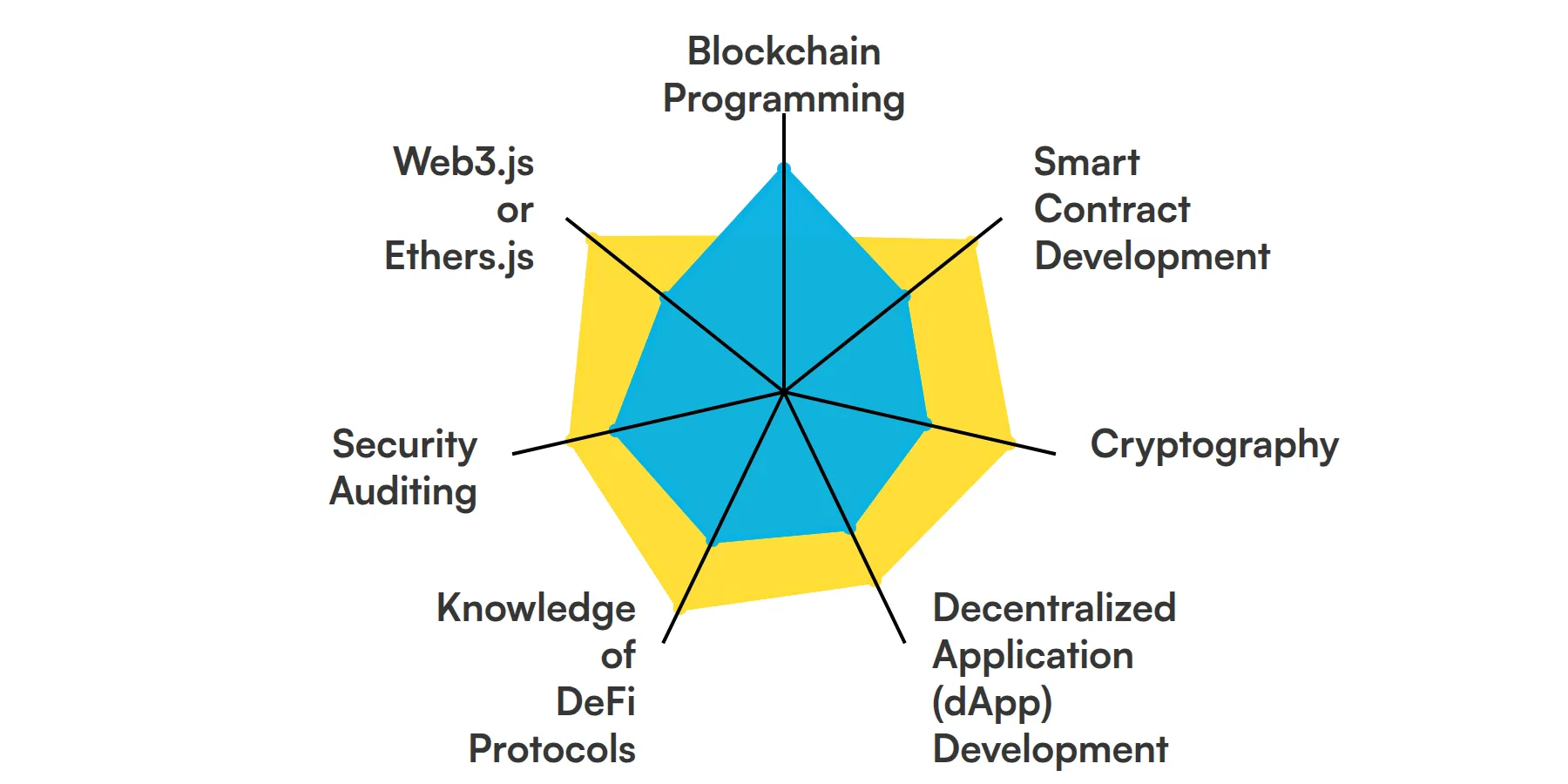
Blockchain Programming
Understanding blockchain concepts and programming is crucial for a software engineer in DeFi. Working with decentralized platforms requires expertise in languages like Solidity used in smart contracts. This skill enables engineers to build, audit, and maintain the backbone of DeFi applications.
For more insights, check out our guide to writing a Blockchain Developer Job Description.
Smart Contract Development
Smart contracts are self-executing contracts with the terms of the agreement directly written into code. A DeFi software engineer needs to design, implement, and deploy smart contracts to create decentralized financial products. Mastery of this skill helps to ensure secure and functional DeFi applications.
Cryptography
Cryptography ensures secure communication and data protection in DeFi applications. A software engineer uses cryptographic techniques to protect user data and transactions. This skill is essential to maintaining trust and integrity in a decentralized financial ecosystem.
Check out our guide for a comprehensive list of interview questions.
Decentralized Application (dApp) Development
Building user-friendly dApps involves using frameworks like Truffle or Hardhat. A DeFi software engineer must design and develop dApps that interact seamlessly with the blockchain. This skill ensures that end-users have an intuitive and smooth experience.
Knowledge of DeFi Protocols
Familiarity with DeFi protocols like Uniswap, Aave, or Compound is vital. A software engineer in this field should understand how these protocols operate and how to integrate them into new applications. Staying updated with these systems enhances the ability to innovate and improve existing solutions.
For more insights, check out our guide to writing a Software Engineer (Defi) Job Description.
Security Auditing
Security is paramount in DeFi to protect against vulnerabilities and attacks. A DeFi software engineer must frequently audit code for potential security breaches. Understanding the best practices in security helps protect users and maintain application integrity.
Web3.js or Ethers.js
Interacting with the Ethereum blockchain requires using libraries like Web3.js or Ethers.js. A software engineer in the DeFi space leverages these tools to enable user interactions with smart contracts from a web context. Expertise in these libraries is crucial for building responsive and interactive applications.
6 secondary Software Engineer (Defi) skills and traits
The best skills for Software Engineer (Defi)s include Financial Acumen, Knowledge of Consensus Mechanisms, API Integration, Front-end Development, Testing and Debugging and Data Analysis.
Let’s dive into the details by examining the 6 secondary skills of a Software Engineer (Defi).
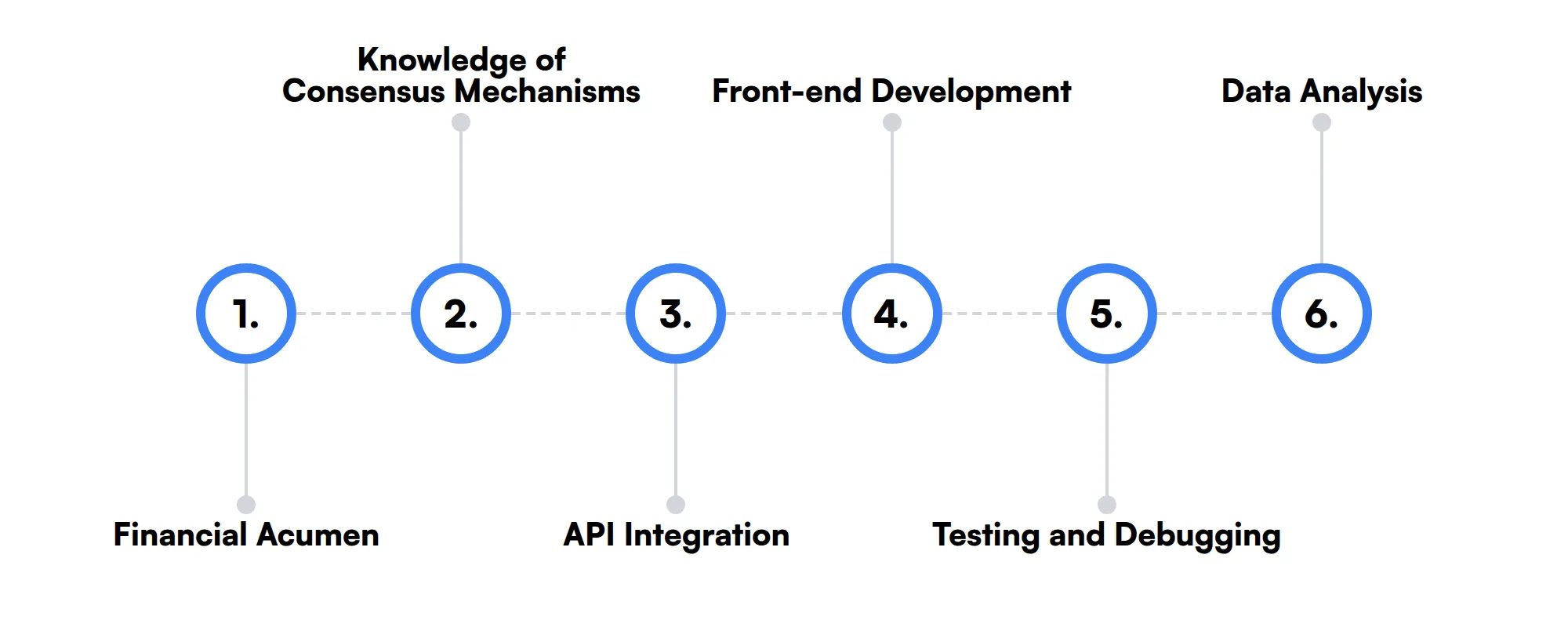
Financial Acumen
Understanding financial principles and concepts is helpful in the DeFi sector. It allows software engineers to create applications that meet the diverse needs of users seeking financial independence through decentralized platforms.
Knowledge of Consensus Mechanisms
Consensus mechanisms like Proof of Work and Proof of Stake are fundamental to blockchain functionality. Familiarity with these allows software engineers to understand, troubleshoot, and innovate in DeFi spaces.
API Integration
Integrating third-party APIs is important for adding functionalities such as price feeds and data inputs to DeFi applications. A software engineer often needs to connect DeFi apps seamlessly with various data sources.
Front-end Development
Having skills in front-end development frameworks enhances a software engineer's ability to build intuitive user interfaces for DeFi dApps. This ensures a pleasant user experience which is crucial for adoption.
Testing and Debugging
Thorough testing and debugging of DeFi applications help in ensuring their reliability and security. Implementing proper testing strategies is essential for deploying stable applications in the DeFi industry.
Data Analysis
Being able to analyze blockchain data helps software engineers understand user behavior and improve DeFi applications. This skill supports better decision-making and strategic development in the fast-paced DeFi ecosystem.
How to assess Software Engineer (Defi) skills and traits
When it comes to assessing the skills and traits of a Software Engineer specializing in DeFi, the task can be as nuanced as the technology itself. These engineers possess a unique set of abilities ranging from blockchain programming and smart contract development to cryptography and decentralized application (dApp) development. Like any specialized field, relying solely on resumes is insufficient to gauge a candidate's suitability for a particular role within the DeFi ecosystem.
To accurately evaluate a candidate's expertise and fit for your team, consider using structured, skills-based assessments. These tools provide a clearer picture of a candidate's competencies and ensure they can handle the complexities of DeFi protocols and security auditing. Skills assessments are crucial not just for verifying technical capabilities, but also for understanding a developer's approach to innovative technologies such as Web3.js or Ethers.js.
Using Adaface on-the-job skill tests, you can significantly streamline your hiring process, achieving up to a 2x improvement in the quality of hires. These assessments are tailored to evaluate critical DeFi skills, thereby reducing screening time by 85% and allowing for a more thorough understanding of each applicant's strengths and potential areas for growth.
Let’s look at how to assess Software Engineer (Defi) skills with these 5 talent assessments.
Blockchain Developer Test
Our Blockchain Developer Test evaluates skills in blockchain architecture, consensus algorithms, and decentralized application development.
Candidates must demonstrate an understanding of smart contracts, tokenization, and blockchain security. The questions challenge their ability to handle real-world scenarios involving distributed ledger technology and blockchain platforms.
Successful candidates show proficiency in building blockchain solutions that integrate seamlessly with existing systems while maintaining scalability and security.
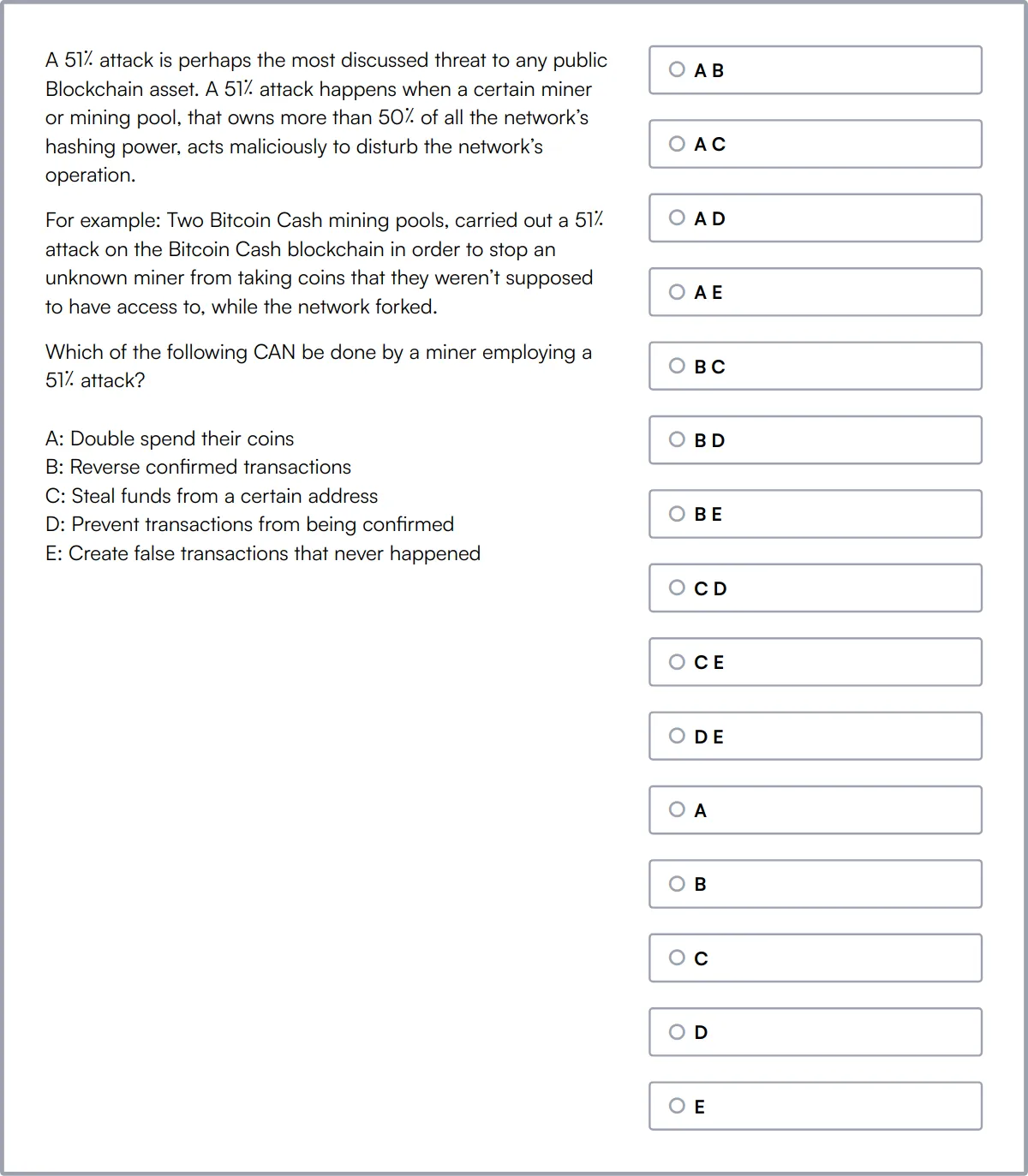
Solidity Test
Our Solidity Test assesses proficiency in the Solidity programming language, focusing on smart contracts on the Ethereum blockchain.
The test evaluates skills in Solidity syntax, contract deployment, and error handling. Candidates navigate scenarios involving blockchain integration and security practices.
High-scoring candidates have a strong grasp of writing secure smart contracts and demonstrate an understanding of debugging and Solidity testing frameworks.
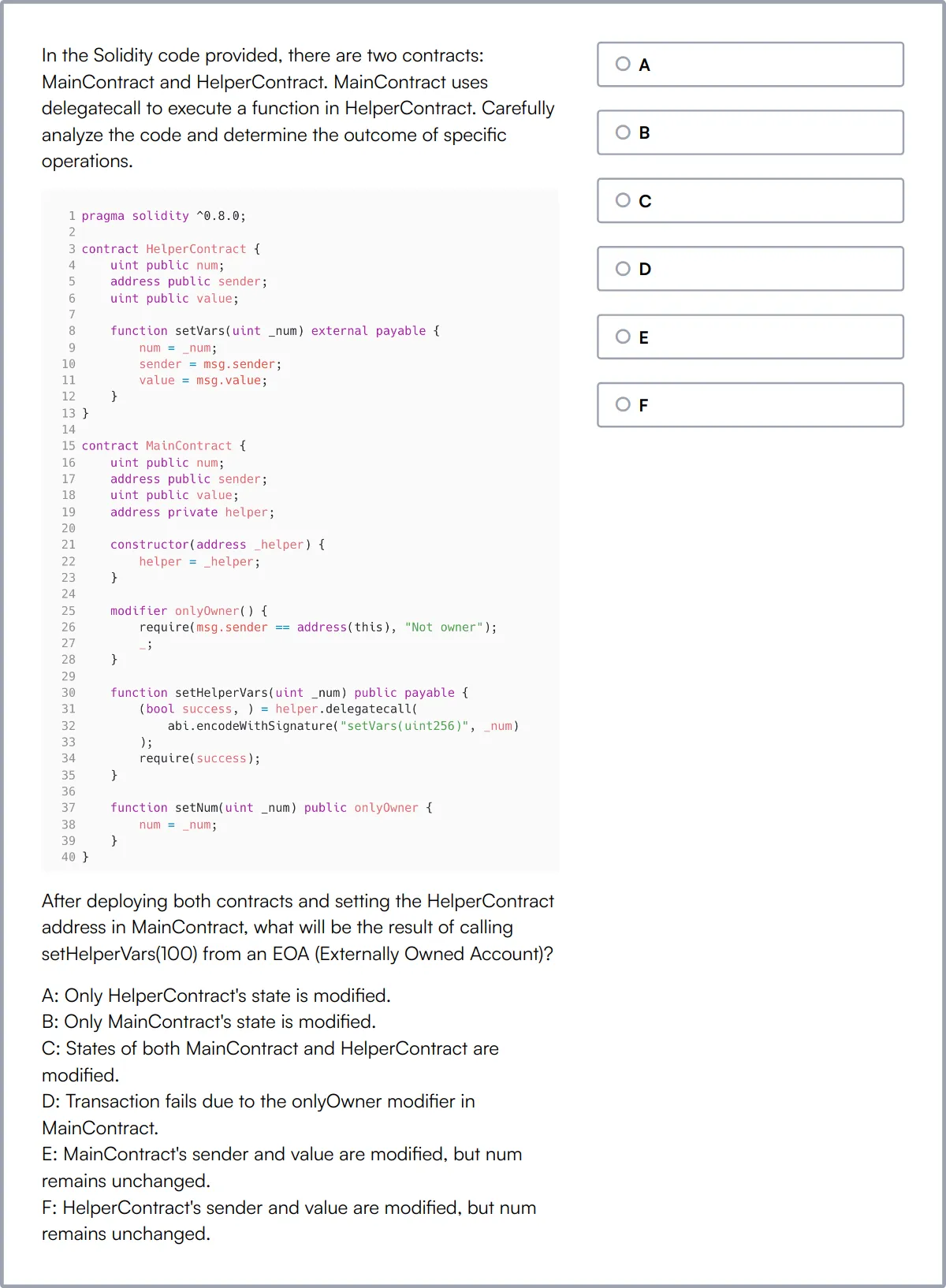
Cryptography Test
Our Cryptography Test evaluates candidates on cryptography concepts and their application in cyber security.
Candidates should understand cryptography algorithms, hashing techniques, and digital signatures. The test examines knowledge across encoding/decoding and network security.
Candidates who excel in this test have comprehensive knowledge in cryptography and its practical applications in securing digital communications.
Decentralized Finance (DeFi) Test
Our DeFi Test assesses understanding of DeFi protocols and blockchain technologies.
The test covers decentralized exchanges, liquidity pools, and yield farming. Candidates' knowledge in security and governance within the DeFi ecosystem is crucial for performance.
Successful candidates demonstrate an ability to work with DeFi platforms like lending, borrowing, and stablecoins, showing skills in leveraging decentralized finance technologies.
Cyber Security Assessment Test
Our Cyber Security Assessment Test measures proficiency in network and web security, cryptography, and malware protection.
Candidates need an understanding of network security protocols, cybersecurity attacks, and data security practices. The test examines the ability to apply defensive strategies and perform risk assessments.
Candidates who score well exhibit a keen understanding of identifying security risks and implementing effective safeguards against various cyber threats.
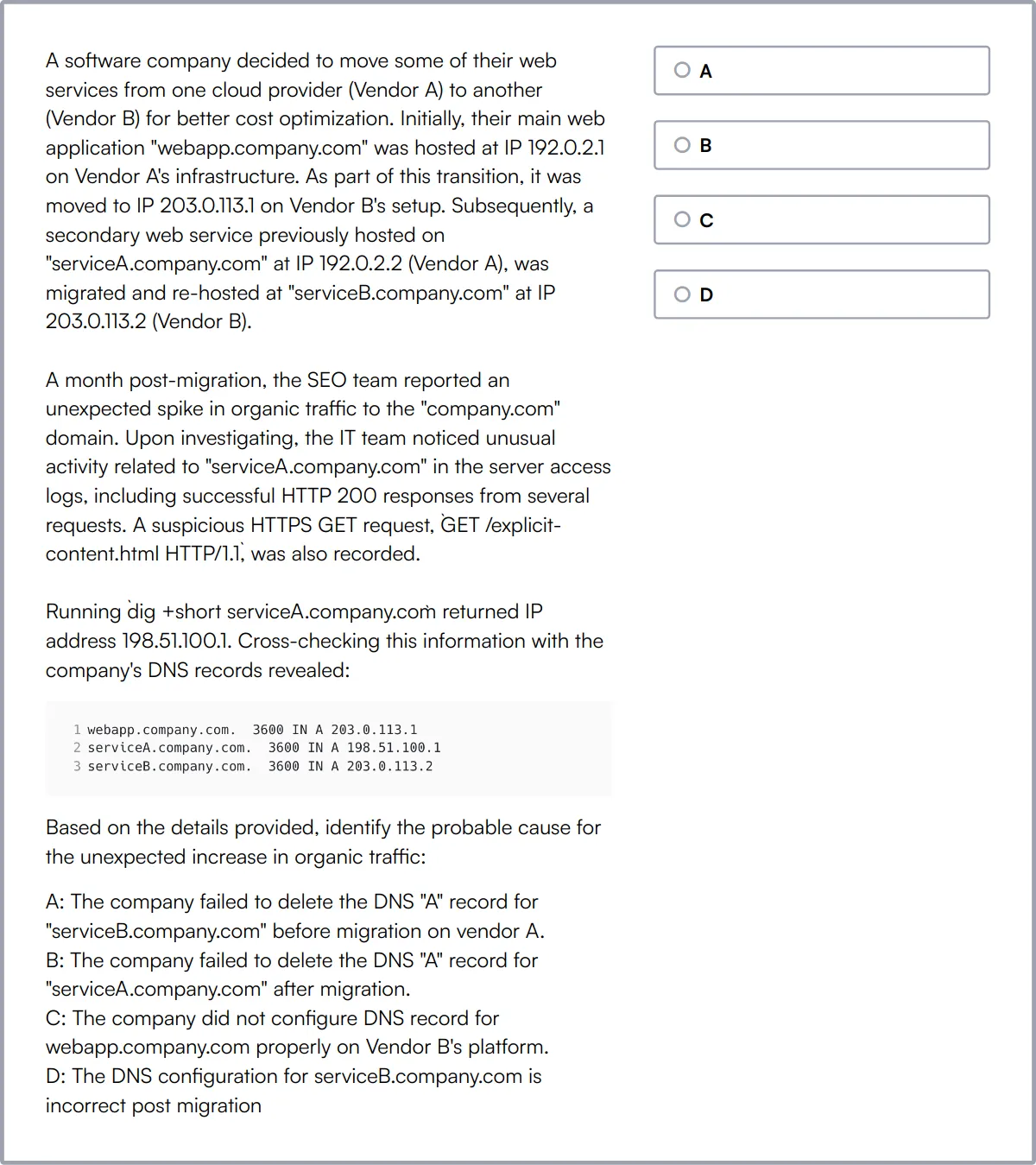
Summary: The 7 key Software Engineer (Defi) skills and how to test for them
| Software Engineer (Defi) skill | How to assess them |
|---|---|
| 1. Blockchain Programming | Evaluate understanding of blockchain technology and relevant programming languages. |
| 2. Smart Contract Development | Assess capability to design, code, and deploy smart contracts. |
| 3. Cryptography | Judge knowledge of cryptographic principles and implementations in blockchain. |
| 4. Decentralized Application (dApp) Development | Check proficiency in creating functional and secure dApps. |
| 5. Knowledge of DeFi Protocols | Review understanding of various decentralized finance protocols. |
| 6. Security Auditing | Analyze ability to identify and mitigate security vulnerabilities. |
| 7. Web3.js or Ethers.js | Assess ability to interact with Ethereum blockchain using JavaScript libraries. |
System Design Online Test
Software Engineer (Defi) skills FAQs
What qualities should recruiters look for in a blockchain programmer?
Recruiters should look for a strong understanding of blockchain architectures and experience with relevant programming languages such as Solidity, Rust, or Go. Practical experience in blockchain projects is beneficial.
How can I assess a candidate's skill in smart contract development?
Ask candidates to explain and demonstrate their experience in developing and deploying smart contracts on blockchains like Ethereum. Request examples of past projects or a simple code exercise.
What skills are important for assessing cryptographic expertise in DeFi roles?
Candidates should have knowledge of symmetric and asymmetric encryption, hashing functions, and zero-knowledge proofs. Query their understanding of cryptographic libraries and security best practices.
Why is knowledge of DeFi protocols important, and how can it be assessed?
Understanding DeFi protocols ensures the candidate can build applications that interact with these systems. Assess this by asking candidates about their experience with protocols like Uniswap, Aave, or Compound.
What should I look for in a candidate's dApp development experience?
Evaluate their proficiency in tools and frameworks such as Web3.js or Ethers.js. Look for a portfolio of dApps they've developed, highlighting user interactivity and integration with blockchain networks.
How can recruiters evaluate experience in security auditing?
Inquire about the candidate's experience with auditing tools and past security reviews. Analyzing their ability to find vulnerabilities in smart contracts is key. Certifications can also be an indicator.
What role does financial acumen play in a DeFi software engineering role?
A good grasp of financial concepts aids in understanding DeFi products like lending platforms. Assess using hypothetical scenarios where candidates must design or evaluate financial models.
How can API integration skills be evaluated in DeFi development?
Request demonstration of past projects involving API integration. Discuss their experience with RESTful APIs or specific blockchain APIs. A practical task can further gauge skill levels.

40 min skill tests.
No trick questions.
Accurate shortlisting.
We make it easy for you to find the best candidates in your pipeline with a 40 min skills test.
Try for freeRelated posts
Free resources



